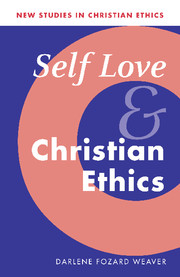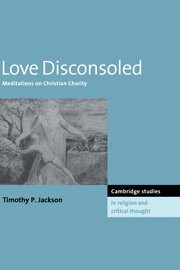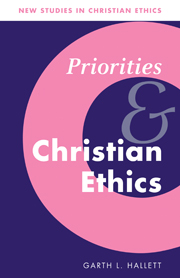Self Love and Christian Ethics
Self love is an inescapable problem for ethics, yet much of contemporary ethics is reluctant to offer any normative moral anthropologies. Instead, secular ethics and contemporary culture promote a norm of self-realization which is subjective and uncritical. Christian ethics also fails to address this problem directly, because it tends to investigate self love within the context of conflicts between the self's interests and those of her neighbors. Self Love and Christian Ethics argues for right self love as the solution of proper self-relation that intersects with love for God and love for neighbor. Darlene Fozard Weaver explains that right self love entails a true self-understanding that is embodied in the person's concrete acts and relations. In making this argument, she calls upon ethicists to revisit ontological accounts of the self and to devote more attention to particular moral acts.
- Questions the meaning of self in a postmodern era and the contemporary promotion of self-realization as an uncritical value
- Innovative and engaging debate on the propriety of self love in Christian ethics
- Challenges contemporary ethicists to review the importance of moral and theological norms and acts
Reviews & endorsements
"In her thorough study, a contribution to a prestigious series, Darlene Fozard Weaver addresses a central and fairly neglected theme: the meaning and moral implications of proper self-love." Theological Studies
"This book provides very refreshing and illuminating perspective on many issues, as Weaver carefully brings out the insights of hermeneutical theories to the crowded and confused field of Christian discourse on love." Journal of Religion
Product details
November 2002Hardback
9780521817813
282 pages
216 × 140 × 19 mm
0.442kg
Available
Table of Contents
- 1. The contemporary problem of self love
- 2. Self love in Christian ethics
- 3. A hermeneutical account of self-relation
- 4. Right self love
- 5. Self love and moral action
- 6. Self love, religion and morality.






